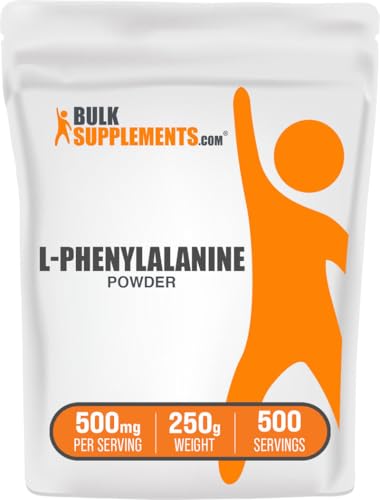L-Phenylalanine: Does It Help With Blood Sugar?
Quick Summary: Research suggests that taking L-phenylalanine might help your body manage blood sugar levels by boosting the release of certain hormones. However, the study was small, and more research is needed to confirm these findings.
What The Research Found
This study looked at how L-phenylalanine affects the body compared to D-phenylalanine and a placebo (a sugar pill). The researchers found that taking L-phenylalanine (but not D-phenylalanine) seemed to:
- Increase insulin and glucagon: These are hormones that help regulate blood sugar.
- Boost GIP: This hormone also plays a role in blood sugar control.
- Lower blood sugar after a meal: This suggests L-phenylalanine might help the body use glucose (sugar) more effectively.
Study Details
- Who was studied: 11 healthy people participated in the main part of the study.
- How long: The main part of the study lasted a few months. Each participant took the supplement or placebo on different days.
- What they took: Participants took either 10 grams of L-phenylalanine, 10 grams of D-phenylalanine, or a placebo.
What This Means For You
This research is preliminary, but it suggests that L-phenylalanine might help with blood sugar control. This could be interesting for people looking to manage their blood sugar levels. However:
- Talk to your doctor: Before taking any supplements, especially if you have diabetes or other health conditions.
- Don't expect a miracle: This study is small, and more research is needed. L-phenylalanine is not a proven treatment for any condition.
- Focus on a healthy lifestyle: Diet, exercise, and other healthy habits are still the most important things for managing blood sugar.
Study Limitations
It's important to know that this study has some limitations:
- Small group: Only a few people were in the study, so the results might not apply to everyone.
- Short-term effects: The study only looked at the effects of L-phenylalanine for a short time. We don't know if the benefits would last.
- More research needed: This is just one study. More research is needed to confirm these findings and understand the long-term effects of L-phenylalanine.
Technical Analysis Details
Key Findings
L-Phenylalanine (10g) significantly increased insulin and glucagon concentrations pre-meal compared to placebo and D-phenylalanine (P < 0.05). It also elevated glucose-dependent insulinotropic polypeptide (GIP) at 70 minutes post-ingestion relative to D-phenylalanine (P = 0.0420) and placebo (P = 0.0249). Additionally, L-phenylalanine reduced postprandial glucose area under the curve (AUC), suggesting improved glucose regulation. However, no significant effects on subjective appetite or energy intake were observed. D-phenylalanine did not replicate these effects, indicating stereoisomer-specific mechanisms.
Study Design
The study employed a two-part crossover design:
1. Dose-finding phase: Non-randomized, unblinded, conducted in 5 participants (October–December 2017).
2. Acute effects phase: Randomized, double-blind, placebo-controlled, in 11 participants (January–May 2018).
Both phases were conducted at the NIHR Imperial Clinical Research Facility. The crossover design allowed within-subject comparisons, but sample sizes were small, and demographics (e.g., age, BMI) were not reported.
Dosage & Administration
Escalating oral doses of L-phenylalanine (0, 3, 6, 10g) were tested in the dose-finding phase. The acute phase used a fixed 10g dose of L-phenylalanine, D-phenylalanine, or placebo. Supplements were ingested with 200mL water, followed by an ad libitum meal 70 minutes later.
Results & Efficacy
- Insulin: L-phenylalanine increased concentrations at multiple pre-meal time points vs. placebo and D-phenylalanine (P < 0.05).
- Glucagon: Similarly elevated pre-meal with L-phenylalanine (P < 0.05).
- GIP: At 70 minutes, L-phenylalanine raised GIP vs. D-phenylalanine (P = 0.0420) and placebo (P = 0.0249).
- Glucose AUC: Reduced postprandially after L-phenylalanine, though exact values were not quantified.
- Appetite & Energy Intake: No significant differences across groups.
Limitations
- Small sample size: Only 5 participants in dose-finding and 11 in the acute phase, limiting statistical power.
- Short-term effects: Outcomes measured over 70–120 minutes; long-term impacts unknown.
- Unblinded design: The first phase’s lack of blinding may have introduced bias.
- Unclear demographics: Age, sex, or health status of participants were not specified.
- Limited appetite sensitivity: The study was not powered to detect meaningful changes in appetite.
- Single-center data: Findings may lack generalizability.
Clinical Relevance
L-phenylalanine (10g) may transiently enhance insulin, glucagon, and GIP release, potentially supporting glucose metabolism. However, the lack of appetite modulation and small sample size suggest caution in extrapolating benefits for weight management or chronic metabolic conditions. The stereoisomer-specific effects (L vs. D) highlight the importance of molecular configuration in supplement formulation. Larger, long-term trials are needed to assess therapeutic potential for glucose regulation or diabetes management. Users should note that acute effects do not guarantee sustained efficacy or safety.
Source: PubMed (2021)
Original Study Reference
Differential effects of L- and D-phenylalanine on pancreatic and gastrointestinal hormone release in humans: A randomized crossover study.
Source: PubMed
Published: 2021
📄 Read Full Study (PMID: 32991046)



